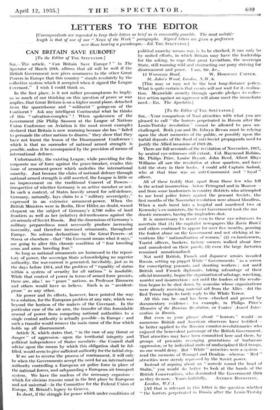LETTERS TO THE EDITOR
[Correspondents are requested to keep their letters as brief as is reasonably possible. The most suitable length is that of one of our " News of the Week" paragraphs. Signed letters are given a preference over those bearing a pseudonym:Ed. THE SPECTATOR.]
CAN BRITAIN SAVE EUROPE?
[To the Editor of THE SPECTATOR.]
Sut,—The article, " Can Britain Save Europe ? " in The Spectator of March 29th, affirms that all will be well if the British Government now gives assurances to the other Great Powers in Europe that this country " stands resolutely by the collective system which it accepted when it signed the League Covenant." I wish I could think so.
In the first place, is it not rather presumptuous to imply, as so much of our thinking on this question of peace or war implies, that Great Britain is on a higher moral plane, detached from the quarrelsome and " militarist " goings-on of the Continent ? Ask any intelligent Continental what he thinks of this " salvation-complex " ! When spokesmen of the Government (Sir Philip Sassoon at the League of Nations Union Conference on Aviation is the most recent example) declared that Britain is now rearming because she has " failed to persuade the other nations to disarm;' they show that they have not learnt the lesson of the Disarmament Conference : which is that no surrender of national armed strength is possible, unless it be accompanied by the provision of means of international defence.
Unfortunately, the existing League, while providing for the corporate use of force against the peace-breaker, evades this issue of armament-power which underlies the international anarchy. Just because the claim of national defence through national armed strength is still asserted, the League is little or no improvement on the traditional Concert of Powers— irrespective of whether Germany is an active member or not. In such a context, of States heavily armed for self-defence, Germany, naturally, lays claim to a " military sovereignty," expressed in an extensive armament-power. When the British Ministers were in Berlin, Herr Hitler, no doubt, waxed eloquent on the subject of Germany's 3,700 miles of land frontiers as well as her (relative) defencelessness against the air armada of Soviet Russia. But the dimensions of Germany's military preparedness must necessarily produce increasing insecurity, and therefore increased armaments, throughout Europe. No solemn declarations by the Great Powers—at Stresa or elsewhere—that "the Covenant means what it says," are going to alter this chronic condition of " fear breeding arms and arms breeding fear."
So long as national armaments are harnessed to the reposi- tory of power, the sovereign State acknowledging no superior authority, the war-current is generated, inevitably, just as in the days before 1914, and the problem of " equality of status within a system. of security for all nations " is insoluble. While that contest of power in terms of armed force persists, there are, alas ! no " peace " nations,' as Professor Zimmern and others would have us believe. Each is as " accident- prone as any other. Air power and its effects, however, have pointed the way to a solution, for the European problem at any rate, which was beyond the horizon of the makers of the Covenant. In the particular case of the air arm, the transfer of this formidable arsenal of power from competing national authorities to a single Central authority is actually possible—in Europe : and such a transfer would renioVe the main cause of the fear which holds up all disarmament. Article X, which states that, " in the case of any threat or danger of aggression—upon the territorial integrity :and political independence of States membeis—the Council shall adVise opori the means by which this obligation shall be ful- filled, would seem to give sufficient authority for the initial step.
If we are to reverse the process of rearmament, it will only be when the Governments accept the need for an international authority controlling a European 'air police force in place of the national forces, and safeguarding a European. air transport system. We have the nucleus of the necessary organism— which for obvious reasons must in the first place be European and not universal—in the Committee for the Federal Union of Europe, M. Briand's legick to Geneva.
In short, if the Struggle'for pOWer which under'conditionS of
political anarchy means war, is to be checked, it can only be by united efforts, in which Britain may have the leadership for the asking, to cage that great Leviathan, the sovereign State, still roaming wild and obstructing our puny striving for disarmament and peace. — I am, Sir, &c., [This may or may not be the best long-distance policy. What is quite certain is that events will not wait for it realiza- tion. Meanwhile security through specific pledges to collec- tive action against an aggressor will alone meet the immediate need.—En. The Spectator.]


















































 Previous page
Previous page